
Visiting Micro-Grant Recipients | Climate-smart Projects Underway
By: Charlotte Staats - former Adirondack Council Conservation Assistant
Tuesday, December 21. 2021
On Earth Day this year, the Adirondack Council and Essex Farm Institute announced that it awarded 21 micro-grants to local farmers and value-added producers to fund climate-friendly projects. It was the sixth year in which the Council granted funds to local Adirondack farmers and business-owners seeking to reduce their impact on the environment and adapt to climate change.
This fall, Adirondack Council staff visited some of the micro-grant recipients to see how the latest round of micro-grant projects was going. Dillon Klepetar, the Council’s Adirondack Farm Advocate, and Charlotte Staats, Conservation Associate, discussed the successes and challenges farmers and value-added businesses experienced while implementing their proposed projects. The visits were also an opportunity to connect with and better understand each recipient’s experiences as part of the local food system in the unique landscape of the Adirondack Park.
Using Biodiesel at Essex Farm – Essex, NY
Essex Farm is a 1,500 acre sustainable and diversified farm found in the town of Essex in the Champlain Valley. They offer a full diet, year-round Community Sponsored Agriculture (CSA) membership that can be picked up weekly on-farm or delivered door-to-door in New York City, the Capital Region, Hudson Valley, and the Tri-Lakes area. This year’s micro-grant award enabled Essex Farm to work with a neighboring business to process animal fat that had been rendered from their pasture-raised pigs and cattle to biodiesel. The biodiesel was used to fuel tractors with a reduced carbon emission compared to traditional diesel. Glycerin, the byproduct of the fat-to-biodiesel process, was also used to make soap for cattle care and other farm tasks.
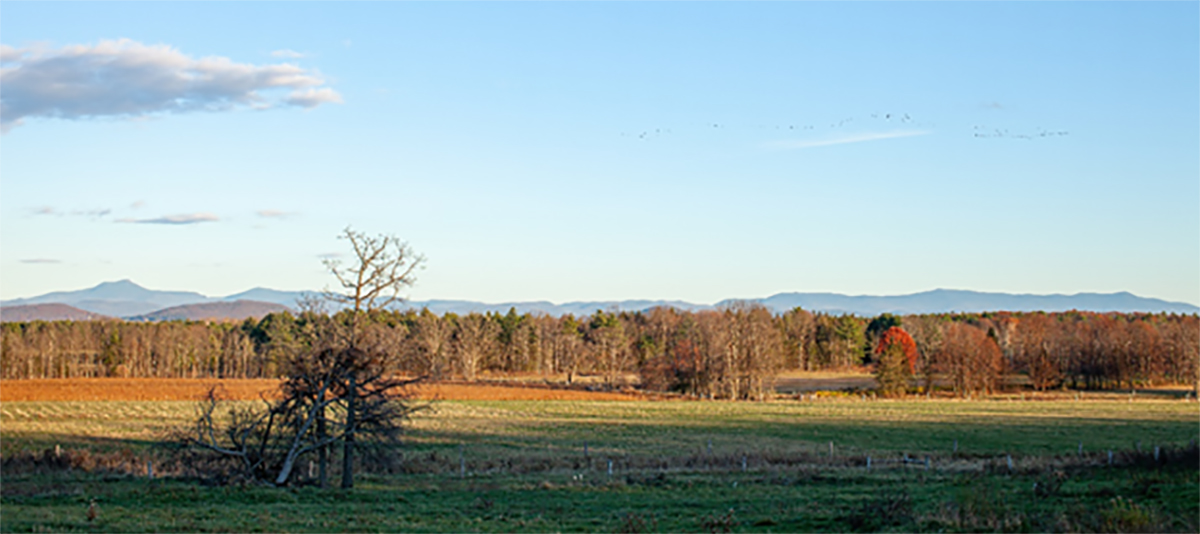 Overlooking Essex Farm fields
Overlooking Essex Farm fields
Building Compost and Soil at Forever Wild Farm – Lake Placid, NY
Forever Wild Farm was started in June 2020 by Naomi Wild. Its mission is to provide high-quality, sustainably grown food products for the local community at affordable prices. High-elevation soils often found in the Adirondacks are coarse and low in nutrients and drain poorly. Naomi and her husband Tyler seek to improve their farm’s soils with compost, which will build healthy soils with better soil structure and higher organic matter. This year’s micro-grant award funded supplies to build a large bin compost system to create compost on-farm from on-site organic waste, and purchase local composted manure to incorporate into the farm’s soils for an initial boost in organic matter.
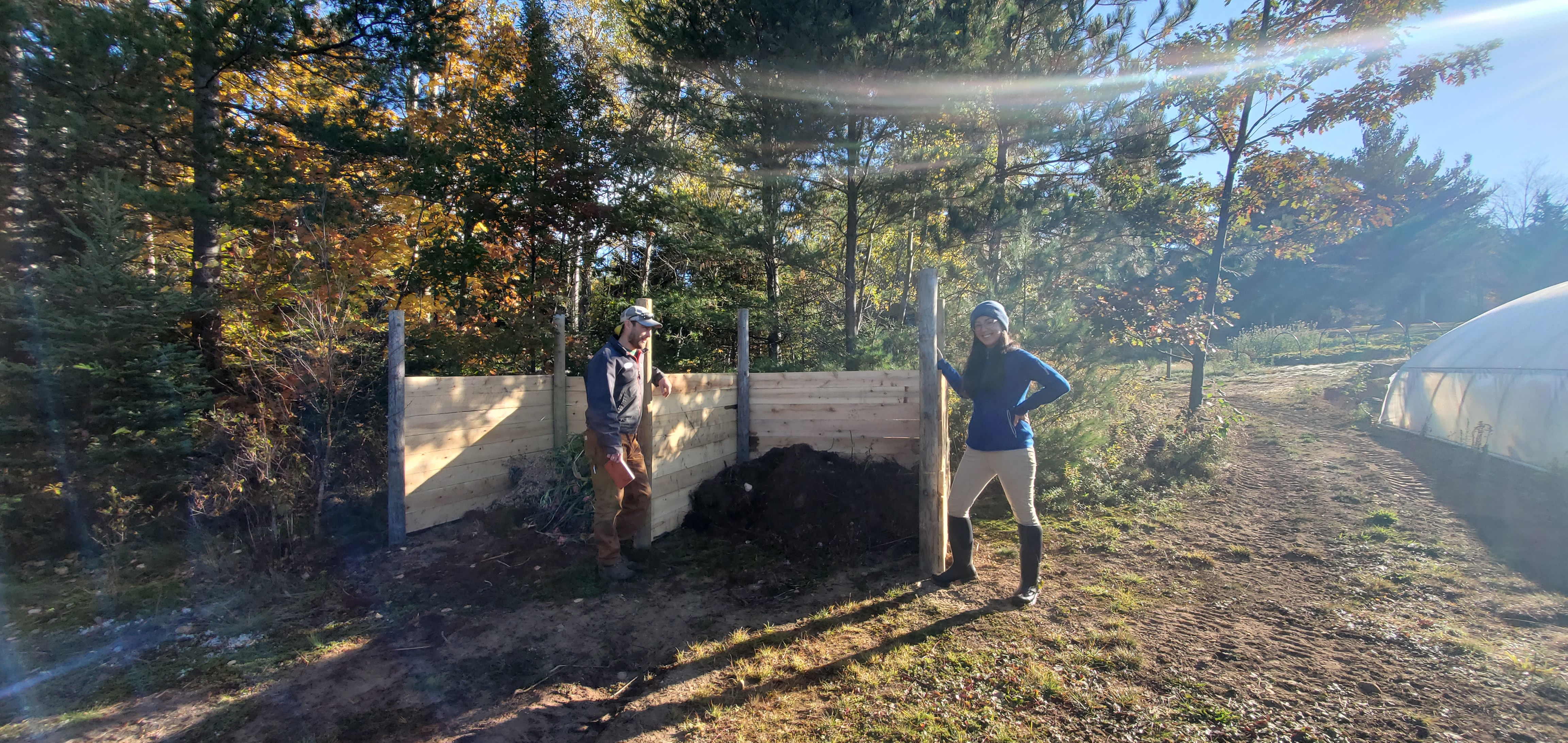 Adirondack Farm Advocate Dillon Klepetar (left) and Naomi Wild (right) discuss the process of
Adirondack Farm Advocate Dillon Klepetar (left) and Naomi Wild (right) discuss the process of
composting and building healthy soils in front of the newly built on-farm composting structure
Solar and Wind-Powered Greenhouse at Adirondack Naturals – Saranac Lake, NY
Adirondack Naturals offers a variety of natural, organic skincare products comprised of plants grown, harvested, and processed on-site. Lynn Boyd, owner and operator of Adirondack Naturals, was awarded funds to erect a greenhouse and a solar/wind-powered inverter and battery bank which will power the greenhouse. These projects taken together will reduce the business’s reliance on fossil fuels and shrink its carbon footprint.
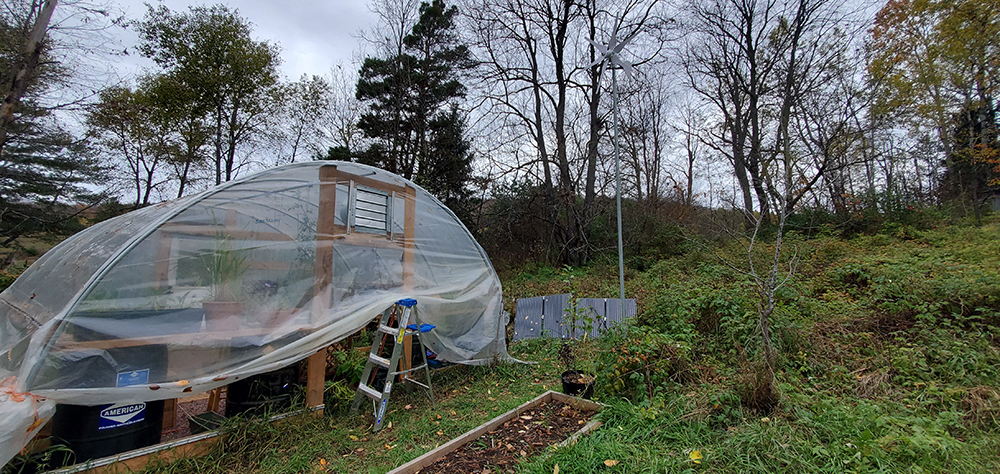 Pictured here are the greenhouse, solar array, and wind turbine funded by the micro-grant. Both the greenhouse and
Pictured here are the greenhouse, solar array, and wind turbine funded by the micro-grant. Both the greenhouse and
solar panel systems are still being finished
Energy Efficiency Improvements at Cornell Uihlein Maple Forest – Lake Placid, NY
Cornell Uihlein Maple Research Forest is an educational, research, and commercial tree syrup production facility. As an educational facility, the operation seeks to find ways to reduce the facility’s energy use and share those energy-saving techniques with other maple producers. The funds from the micro-grant were used to purchase and install a cycle control unit for the vacuum pump used in the collection of sap, a reverse osmosis machine for birch sap, and an electric chainsaw to keep the sap lines clear. Because the vacuum pump cannot collect sap when temperatures are below freezing, the thermostat control shuts the vacuum pump off in freezing conditions. The reverse osmosis system filters water from the collected sap. This minimizes the time and energy needed during the heat evaporation process. Finally, using an electric chainsaw to manage the maple forest reduces fossil fuel consumption and is less disruptive (audibly) to the wildlife who make the maple tree stand their home.
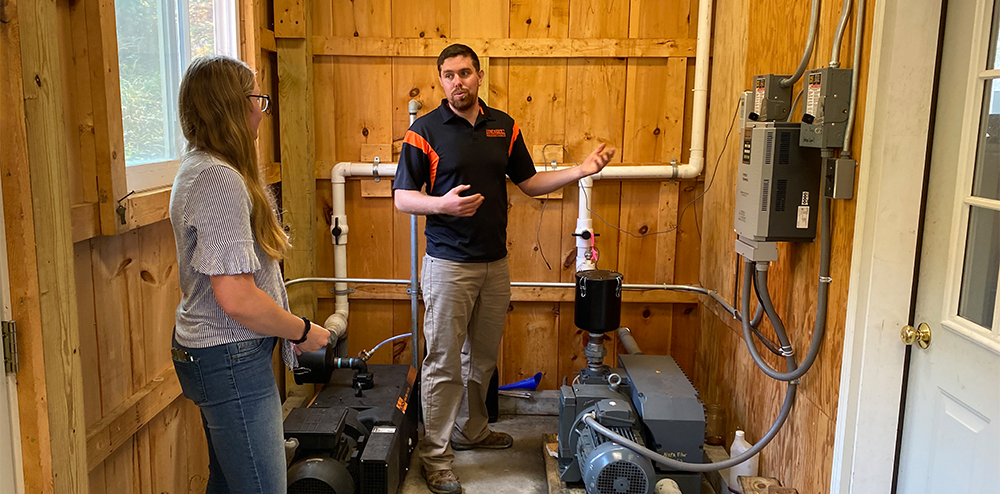 Adam Wild, Director of Cornell University's Uihlein Maple Research Forest, describes
Adam Wild, Director of Cornell University's Uihlein Maple Research Forest, describes
how the cycle control unit works as part of the sap collection system.
Closing the Food Waste Loop with Blue Line Compost LLC – Saranac Lake, NY
Blue Line Compost is a food waste recycling company that aims to create high-quality compost from locally produced food waste. Started in May 2020, the business has collected 13.5 tons of food waste and sought funding to help bag finished compost, which is to be sold locally. Micro-grant funds addressed a funding gap that enabled the business to bag finished compost and sell it.
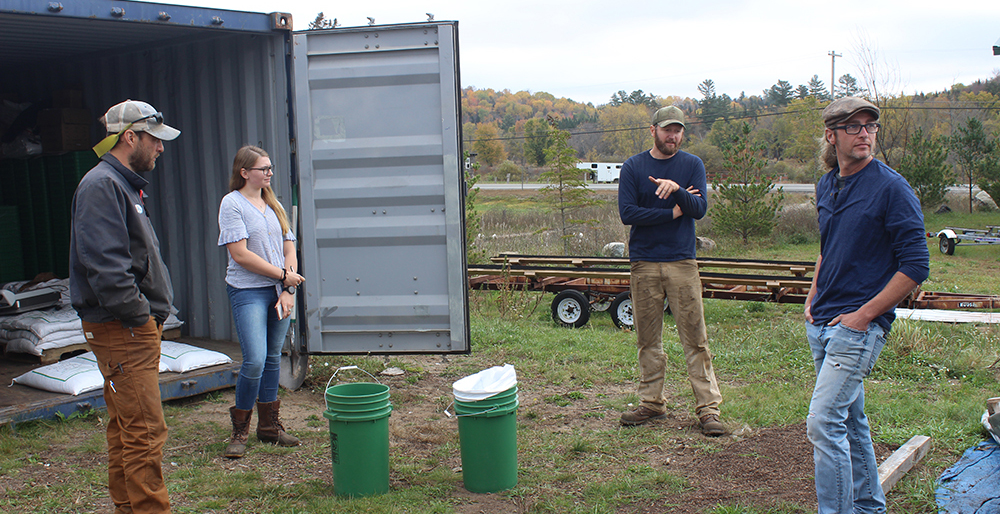 Bill Domenico and Carter Rowley walked Council staff through the bagging process at Blue Line Compost.
Bill Domenico and Carter Rowley walked Council staff through the bagging process at Blue Line Compost.
From right to left - Bill Domenico, Carter Rowley, Charlotte Staats, and Dillon Klepetar
High-flow Composting at Workshop in V-Ville LLC – Redford, NY
Jon Norman and partner Jennifer Perry are in the beginning stages of manufacturing high-flow drum composters, which they plan to sell locally. Their long-term plans include applying mycoremediation processes to waste generated and compost food waste generated in the area. Mycoremediation uses fungi or its derivatives to mitigate environmental pollution or pollutants. With the micro-grant funds awarded and through a partnership with SUNY Plattsburgh, approximately two tons of food waste per week will be collected from the campus, transported to the high-flow drum composter on-site, and transformed into compost material.
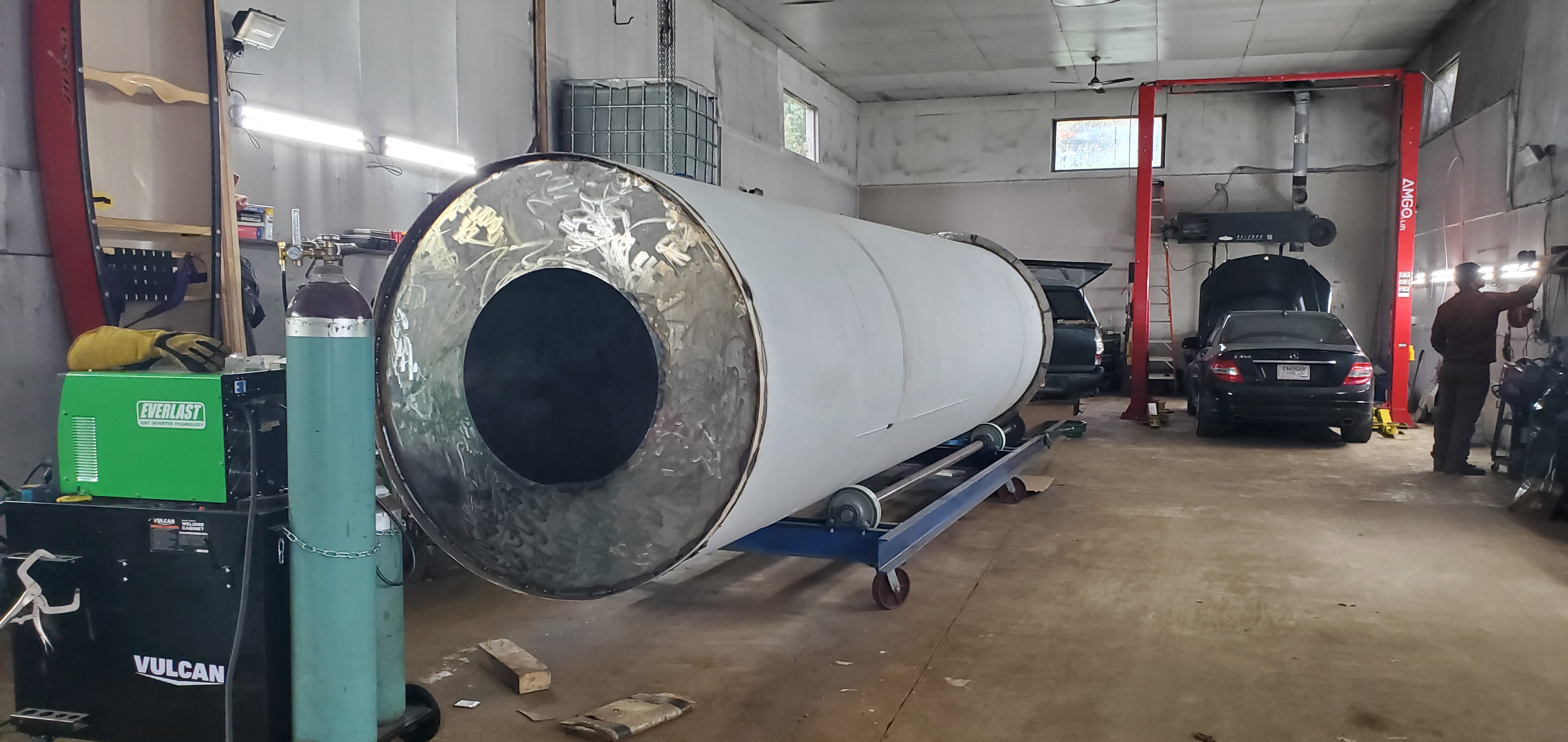 The high-flow drum composter built by Jon Norman to turn local food waste into compost
The high-flow drum composter built by Jon Norman to turn local food waste into compost
Accessible Local Food from Berube Botanicals – Vermontville, NY
Berube Botanicals is a processor dedicated to growing nutrient-dense vegetables and herbs, high-quality medicinal plants and flowers, and developing all-natural herbal wellness products. Owner Lauri Berube utilized her micro-grant award to construct a farm stand to sell produce and products directly to consumers in the area. The farm stand provides reliable access to locally grown foods, including those items produced in Berube’s hightunnel, to the residents and visitors of Vermontville.
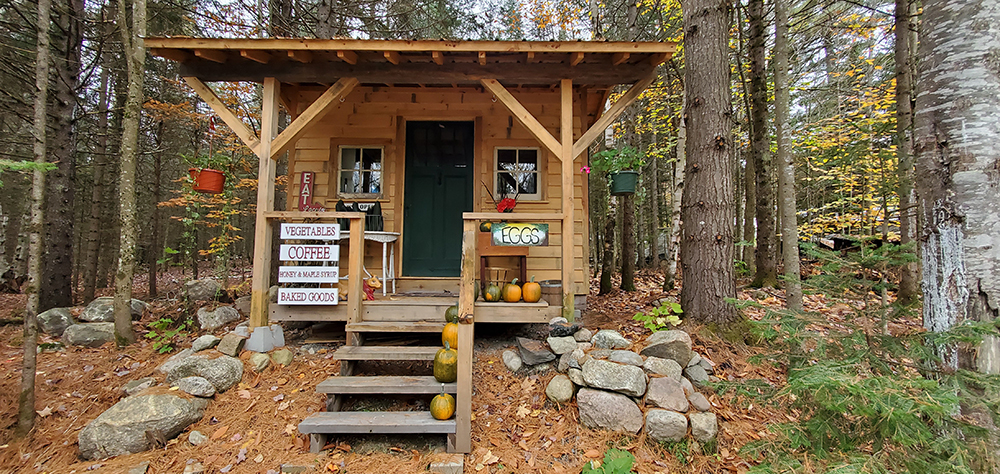 Berube Botanical's farm stand in Vermontville
Berube Botanical's farm stand in Vermontville
Solar Fencing on Blackberry Hill Farm – Athol, NY
Blackberry Hill Farm is a diversified farm that grows a variety of vegetables, herbs, and livestock. Bob Barody, owner and operator, sells products in the farm stand and at several farmers’ markets in the area. With the awarded funding, Rob was able to purchase portable solar-powered fencing to be used in the implementation of the farm’s pasture management. The fencing will allow for smaller paddocks with shorter grazing periods, which will lead to healthier pastures for more sustainable beef production. This method concentrates livestock in a smaller area of the pasture for a short period of time before moving them to a new pasture area. Rotational grazing at Blackberry Hill Farm will also increase soil carbon retention and water infiltration in the fields to reduce storm runoff into the nearby Hudson River.
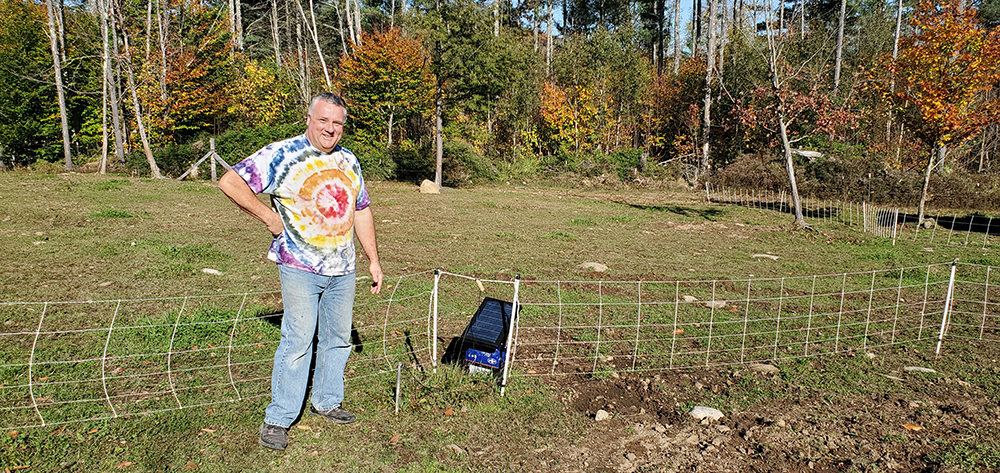 Bob Barody with the solar-powered fencing purchased with micro-grant funds
Bob Barody with the solar-powered fencing purchased with micro-grant funds
Energy Efficient Fermenting at Ausable Brewing Company LLC – Keeseville, NY
Ausable Brewing Company uses NY-grown and imported grain, malt, and hops to brew their beer. They also grow some of their own hops and fruit to use and occasionally source other fruit and herbs from local farms occasionally. Ausable Brewing Company purchased three new insulated fermentation vessels, which were offset with micro-grant funding. Before this investment, the brewery had three uninsulated fermenting vessels that required far more energy for continuous refrigeration to cool the vessels to the desired temperature.
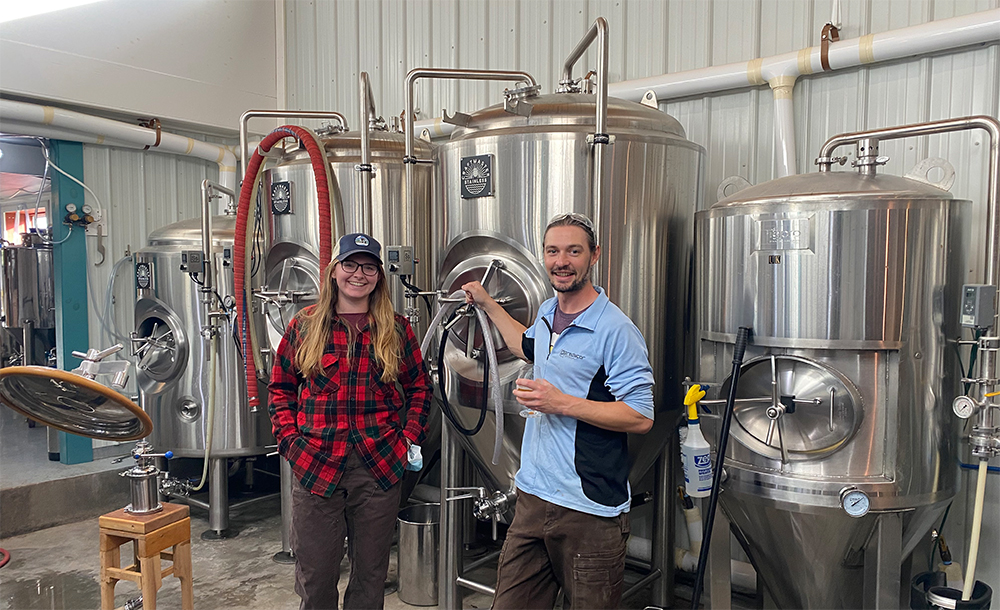 Dylan Badger and Charlotte Staats (Conservation Assistant) stand in front of the new insulated fermentation vessels
Dylan Badger and Charlotte Staats (Conservation Assistant) stand in front of the new insulated fermentation vessels
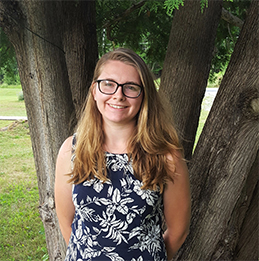
Charlotte Staats was the Adirondack Council’s Conservation Assistant. She was responsible for providing programmatic support, review, analysis, and research of significant conservation and environmental policy issues that the Adirondack Council engages on. She engaged with academic, governmental, and non-profit entities, monitor for emerging conservation issues, and assist in the development of related Council policies and positions. She grew up in Westport, New York, and graduated from Clarkson University in 2017 with a Bachelor of Science in Environmental Science and Policy. For the past five years, Charlotte worked on a professional trail crew, building and maintaining hiking, skiing, mountain biking, and snowshoe trails throughout the Adirondack Park.




